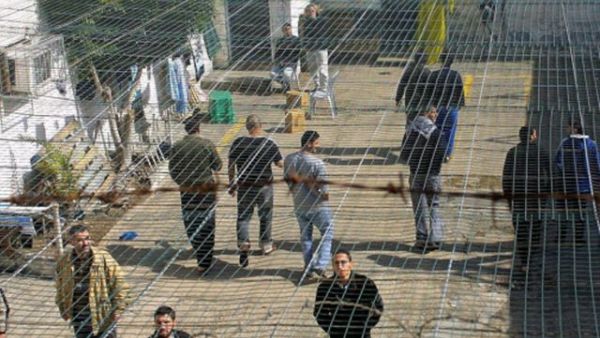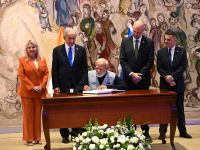The Israeli Prison Service (IPS) returned Palestinian prisoners affiliated with Fatah and Popular Front for the Liberation of Palestine (PFLP) political parties from Israel's Ohalei Kedar prison back to Ramon prison Monday morning, according to Sawt al-Asra (Voice of Prisoners) radio.
IPS forces raided Section 5 in Ramon prison last week, when they moved 100 Fatah and PFLP-affiliated prisoners to Ohalei Kedar in an attempt to destabilize the mass open hunger-strikes that have been launched across Israeli prisons, according to the Palestinian Committee of Prisoners’ Affairs.
The committee made a statement following the mass transfer, saying the raids were a direct response to dozens of prisoners supporting fellow prisoner Bilal Kayid, who has now been on a hunger strike for 48 days, and hunger-striking brothers Muhammad and Mahmoud al-Balboul, who entered their 27th day of hunger strike on Monday, all of whom are protesting Israel's controversial policy of administrative detention, which Israel uses primarily against Palestinians to detain them without trial or charge.
Israeli authorities sentenced Kayid to six months in administrative detention on the day he was due to be released after serving a 14-year sentence in Israeli custody, while the Balboul brothers were detained in early June, just two months after their 14-year-old sister was detained for allegedly possessing a knife while trying to cross a checkpoint into Jerusalem, a charge she was later released for.
Kayid, a PFLP member, is one of the most high-profile hunger strikers since Palestinian journalist Muhammad al-Qiq came near death during a 94-day hunger strike before he was finally released in May.
Kayid's administrative detention has resulted in a mass solidarity movement of PFLP-affiliated prisoners protesting through temporary and open-ended hunger strikes, which has resulted in an equally massive crackdown on mostly PFLP prisoners by the IPS, which has conducted multiple raids, cell block closures, and confiscations of personal property in attempts to quell the strikes.
Secretary-General of the PFLP -- Palestine's most popular secular-left-wing political party -- Ahmad Saadat joined the mass open-hunger strikes in solidarity with Kayid last week, and was immediately placed in solitary confinement by the IPS according to Issa
Qaraqe, the head of the Palestinian Committee of Prisoners’ Affairs.
Qaraqe released a statement Monday morning saying that Saadat's participation in the strikes represents "a new stage" in the mass protests, "that will escalate confrontation with the Israeli prison services."
In addition to a larger-scale crackdown by the IPS, Qaraqe also anticipated that Saadat's presence would "motivate all Palestinian prisoners to step up and join" in solidarity with Kayid and the Balboul brothers.
Highlighting the "life-threatening" and deteriorating health conditions of both Kayid and the Balboul brothers -- one of whom, Mahmoud, was reportedly transferred to Israel's Ramla hospital -- Qaraqe urged Palestinians to organize more protests and solidarity actions in order to help the striking prisoners achieve their demands, such as the multiple sit-in strikes that have been set up across major cities in the occupied West Bank.
Qaraqe met with the families of Kayid and the Balbouls on Monday in Ramallah, along with Palestinian Prime Minister Rami Hamdallah and Deputy of Legislative Council Khalida Jarrar, also a leading member of the PFLP, who was released in June after serving 14 months in prison.
"We are making continues efforts with all international organizations, consulates and ambassadors to put Israel under pressure to release Palestinian prisoners from Israeli jails, starting with prisoners on hunger strike,” Hamdallah said.
Like Qaraqe, Hamdallah -- who visited a sit-in tent erected in Bethlehem's Manger Square -- insisted on the importance of a wide popular solidarity movement with the prisoners' cause, adding that “all Palestinian parties must be unified against the Israeli occupation's violations and confront the challenges that the Palestinian cause is facing.”
He added that the Palestinian government and Palestinian President Mahmoud Abbas “will not rest” and there would be no Palestinian-
Israeli peace agreement until all Palestinian political prisoners were released from Israeli prisons and Israel's administrative detention policy was completely stopped.
Israel's administrative detention policy is widely criticized among Palestinians, who say it has been used to detain family members of Palestinian political leaders, in an extension of several policies that rights groups have deemed “collective punishment” aimed at disrupting family life for Palestinians in the West Bank and East Jerusalem.
According to prisoners’ rights group Addameer, 7,000 Palestinians were being held by Israel as of May, 715 of whom were held in administrative detention.








